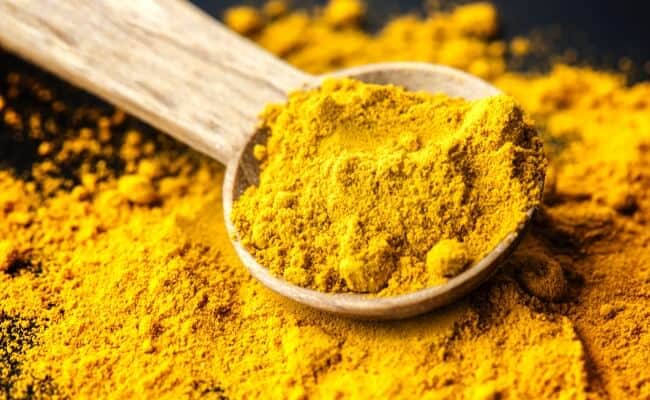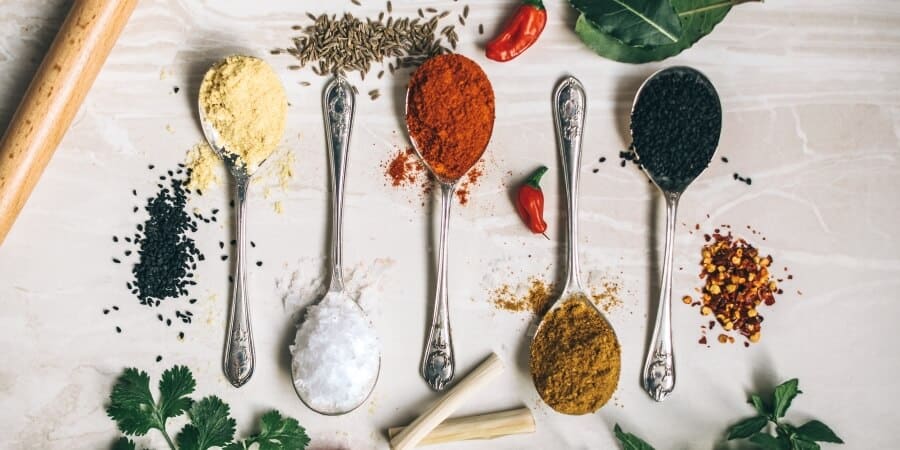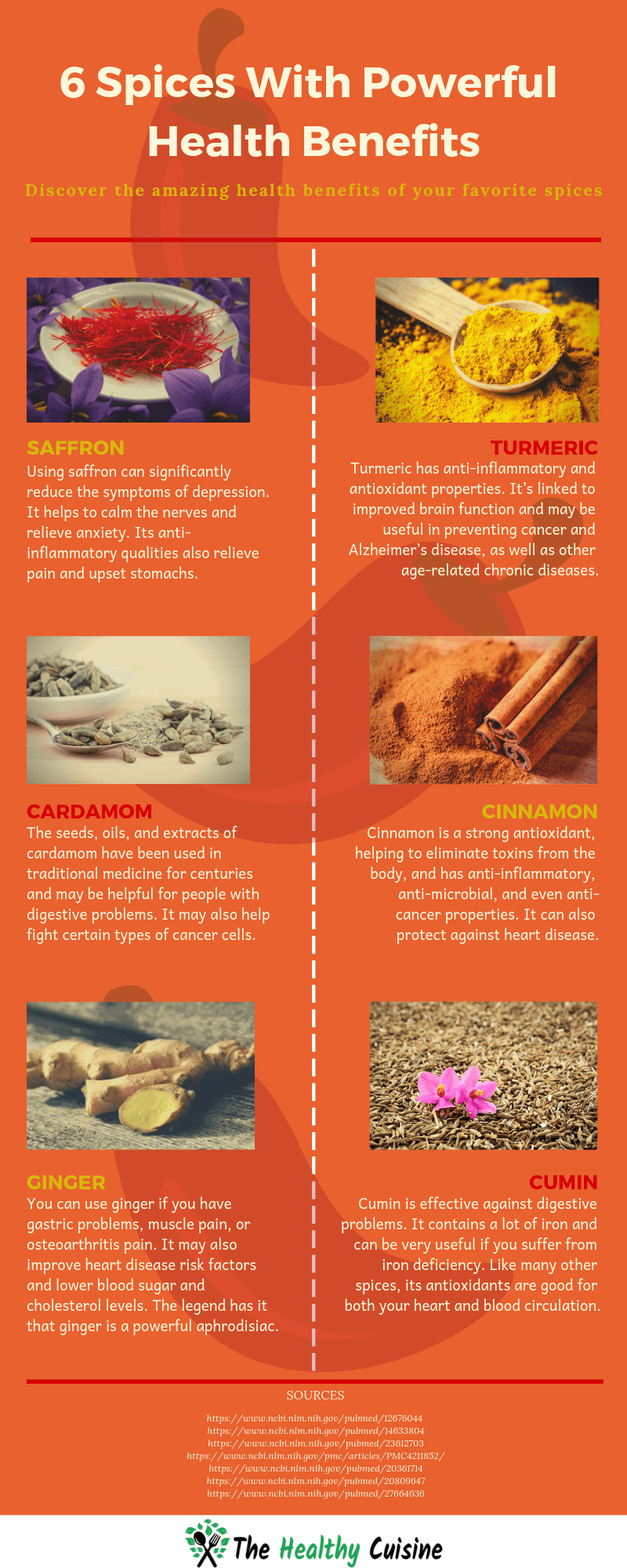Have you ever looked at your spice rack and thought it’s just for making food tasty? I used to think the same! But, boy, was I wrong. Spices are not just about adding flavor to your dishes, they’re packed with numerous health benefits too. I was amazed to find out how they can contribute to our well-being in such significant ways.
Now, I know it might feel a bit overwhelming to think about how to use these spices for health. Don’t you worry! I’ve done the legwork and I’m excited to share the amazing secrets I discovered. In my upcoming article, I’ll walk you through 7 common spices that hold powerful health benefits. You’ll learn about each spice’s unique health perks and get easy, practical tips on how to incorporate them into your meals.
Let’s embark on this flavorful journey to better health together. Trust me, your body and taste buds will thank you! Stay tuned for a sprinkle of spice and a ton of great health tips. Your healthier, happier life is just a spice away!
Spices Are Linked to Powerful Health Benefits
Aside from their interesting and delicious flavors, the great thing about spices is that they’re full of powerful components, which offer numerous health benefits. For centuries, they have been utilized by traditional cultures as medicines as well (1).
They’re rich in antioxidants (2), which help fight oxidative stress. They have anti-inflammatory (3) and antibacterial properties (4), as well as cancer-fighting abilities (5). It’s no wonder that for centuries traditional cuisines from India to China to South America have incorporated so much spice in their food and healing practices.
Let’s shed some light on the amazing health benefits of seven deliciously popular spices.
Health Benefits of Turmeric

Turmeric, with its bright yellow color and distinct smell, is difficult to confuse with any other spice. While it’s excellent on its own, it’s worth mentioning that when you mix it with pepper, its antioxidant properties significantly intensify.
Turmeric is well known for its powerful anti-inflammatory (6) and antioxidant (7) properties. It protects against cell oxidation, and, as a result, also helps to prevent many diseases such as Alzheimer’s (8) and cancer (9). In his book, “Anticancer”, Dr. David Servan-Schreiber classifies it in his list of disease-control foods.
This remarkable spice also has antibacterial (10) and analgesic (11), and digestive properties (12). This spice may be effective in cases of allergies and rheumatism (13), as well.
Turmeric has also been found to have important therapeutic properties. Thanks to the active ingredient curcumin, it may help control blood glucose problems related to diabetes (14) and can help to improve behavioral symptoms in patients with Alzheimer’s Disease (15).
As mentioned, pepper, thanks to the active ingredient piperine, can help to prevent the breakdown of turmeric, allowing it to circulate for longer in the body (16). So, next time you cook with turmeric, sprinkle a bit of pepper on the food to take advantage of the health benefits of turmeric.
Summary: Turmeric contains curcumin, which is the powerful substance with anti-inflammatory and antioxidant properties. It’s linked to improved brain function and may be useful in preventing cancer and Alzheimer’s disease, as well as other age-related chronic diseases.
You can use turmeric in Indian dishes, stews, vegetables, soups, and with meats.
No products found.
Health Benefits of Cinnamon

Mmm, cinnamon… it is remarkably aromatic and it’s also full of health-boosting virtues.
Did you know that cinnamon is made from the inner bark of cinnamon trees? It has been used in herbal medicine for thousands of years.
There are two types of cinnamon: Ceylon cinnamon, which is considered to be true cinnamon; and Cassia cinnamon, the most commonly found variety and the one you buy from the supermarket.
Now, regarding the health benefits—cinnamon is a very powerful spice:
It is a strong antioxidant, helping to eliminate toxins from the body, and has anti-inflammatory, anti-microbial, and even anti-cancer properties (17). Initial studies show it can be effective against HIV infection. (18)
It can protect against heart disease (19) and has a powerful anti-diabetic effect and can also be an ally in regulating blood sugar (20).
Finally, according to a study published this summer in the Journal of Neuroimmune Pharmacology, this spice may also improve memory. (21)
Summary: Cinnamon is one of the most popular spices in the world. Cinnamaldehyde is the substance which is thought to be responsible for most of cinnamon’s health benefits—such as the anti-inflammatory or digestive properties, and the reduction of the risk of heart disease.
You can use cinnamon in desserts, yogurts, rice pudding, compotes, cakes, gingerbread, tea, and coffee.
Health Benefits of Ginger

Ginger is among the healthiest and tastiest spices in the world. It originated from China, and it’s actually the root of the plant that we use in our food and drink.
Now, ancient medicinal practices hold that that ginger is a powerful aphrodisiac (22). Unfortunately, that has never been scientifically proven, but research shows it does have lots of other health benefits.
For example, it’s got digestive and antispasmodic properties, which means it helps fight nausea, vomiting (23), constipation, and gastric diseases (24).
The spice may be effective against coughs (25). Anti-inflammatory, it relieves joint pain (26) and muscle stiffness (27).
Like in turmeric, the antioxidants and bioactive compounds in ginger may improve brain function and protect against Alzheimer’s disease. (28)
It may also improve blood circulation and lower cholesterol. (29)
Summary: Ginger is high in gingerol, a substance with powerful anti-inflammatory and antioxidant properties. You can use ginger if you have gastric problems, muscle pain, or osteoarthritis pain. It may also improve heart disease risk factors and lower blood sugar and cholesterol levels.
You can use ginger in marinades, fish, meat, rice, vinaigrettes, and tea.
Health Benefits of Cardamom
From the same family as turmeric and ginger, cardamom is thought to be a stimulating aphrodisiac (30). It originated in India, but people use it all over the world.
Cardamom is a seed with a green shell and a slightly lemony, minty taste that allows it to be used in both sweet and savory dishes.
It may be effective in treating indigestion and gastrointestinal disorders (31). It’s shown to decrease blood pressure (32) and may help fight cancer cells by increasing the activity of certain enzymes (33).
A 2015 laboratory study showed that the γ-Bisabolene, a certain compound in the spice, stopped oral cancer cells in test tubes from reproducing (34).
Summary: The seeds, oils, and extracts of cardamom have been used in traditional medicine for centuries and may be helpful for people with digestive problems. It may also help fight certain types of cancer cells.
You can use cardamom in Indian curries and stews, gingerbread cookies, bread, and coffee.
- 100% Pure Cardamom Essential Oil - What sets Artizen Essential Oils apart are their...
- Don't Fall Victim To Cheap Diluted Cardamom Oil - Most of the competition dilute...
- Most 4 Ounce Cardamom Oils Contain Less Than 1/3 Of Natural Oil - Unfortunately,...
- High Quality Glass Bottles With Eyedropper - We use high quality glass infused with a...
- Lifetime Warranty - The manufacturer, Artizen Essential Oils, offers a lifetime...
Health Benefits of Cumin
Cumin is a spice found in many Mediterranean, South American, and Asian dishes. Both the cumin seed and ground cumin are used in these cuisines. Because it has a strong aniseed flavor, only a small pinch of cumin is enough to spice up your meal.
Cumin may be effective in helping to treat digestive problems such as stomach pain, nausea, diarrhea (35).
Cumin is an excellent source of iron —just one teaspoon of cumin covers almost 20 percent of your daily needs (36). If you suffer from an iron deficiency, eating cumin could be a way to naturally increase your iron intake.
Terpenes, phenols, flavonoids, and alkaloids are some of the compounds found in cumin that are known to be health-beneficial antioxidants (37). They have been linked to fighting heart disease and cancer (38) and may help with diabetes (39).
Also, black cumin can be useful in preventing bone fragility problems and osteoporosis (40).
Summary: Cumin is the seed of the Cuminum cyminum plant, and it’s incredibly effective against digestive problems. It contains a lot of iron and can be very useful to you if you suffer from iron deficiency. Like many other spices, its antioxidants are good for both your heart and blood circulation.
You can use cumin in rice, raw vegetables, dried vegetables, and cheese.
Health Benefits of Nutmeg

Nutmeg originates from Indonesia and gives a nutty, sweet taste to any dish.
With calming properties, nutmeg can have positive effects on your mood. Thanks to this, nutmeg can help you in many stressful situations and even help fight against depression (41).
Many models of traditional medicine have used nutmeg to fight insomnia (42). Ayurvedic medicine, for example, recommends drinking a glass of warm milk with a pinch of nutmeg in it just before going to sleep.
Nutmeg has antibacterial properties (43) and it may help prevent tooth decay and bad breath (44).
Summary: Nutmeg comes from the seed of the evergreen tree, Myristica fragrans. It has calming properties used to fight insomnia and depression for centuries. It also has antibacterial abilities that help to maintain good oral health.
You can use nutmeg in white sauces, fish, soups, and mashed potatoes.
Health Benefits of Saffron

Saffron is a reddish orange spice picked by hand, making it the most expensive spice on the planet. Saffron is used to both season and color food.
Remarkably, several studies demonstrate that the consumption of saffron may help reduce the symptoms of depression. It helps to calm the nerves and relieve anxiety (45).
According to initial laboratory studies, saffron may help relieve pain thanks to its anti-inflammatory and analgesic qualities (46) and may help in the treatment of nervous system disorders (47).
Saffron may also help with stomach disorders such as constipation, bloating, cramping, flatulence, and even ulcers (48).
Summary: Saffron comes from the plant called the saffron crocus. When used regularly, it has countless health benefits. It can help against depression, upset stomachs, pain, and heart diseases.
You can use saffron in paellas and risottos, but also in desserts such as chocolate cake.
- Natural Fresh Saffron - Grade A+ Saffron
- 100% Pure Saffron Threads / Filaments | Each Gram for 24 Serving
- 100% Fresh Organic Quality Saffron
- 0.18 Ounce (5.0 Grams) Saffron for 120 serving
Bottom Line
Now that you know all the amazing health benefits of these delicious, remarkable spices, there is no doubt that you should add some to every meal! Consuming it every day may yield wonderful health benefits.
I recommend you buy whole, fresh, organic spices and grind them up yourself. As with vegetables, the properties of fresh spices remain intact, while pre-ground spices are significantly less effective. You can get yourself a grinder here.
And you, what is your favorite spice?
FAQ Benefits of Spices
What are the Benefits of Spices?
Spices do more than add flavor to your food! They have many health benefits too. For example, turmeric contains curcumin, which has anti-inflammatory and antioxidant properties. Garlic can help combat sickness, including the common cold. The spice with the most health benefits is turmeric.
Which Spice has the Most Health Benefits?
Turmeric tops the list as the spice with the most health benefits. It’s packed with curcumin, known for its powerful anti-inflammatory effects and strong antioxidant properties. Add a dash to your meals for a healthy boost!








